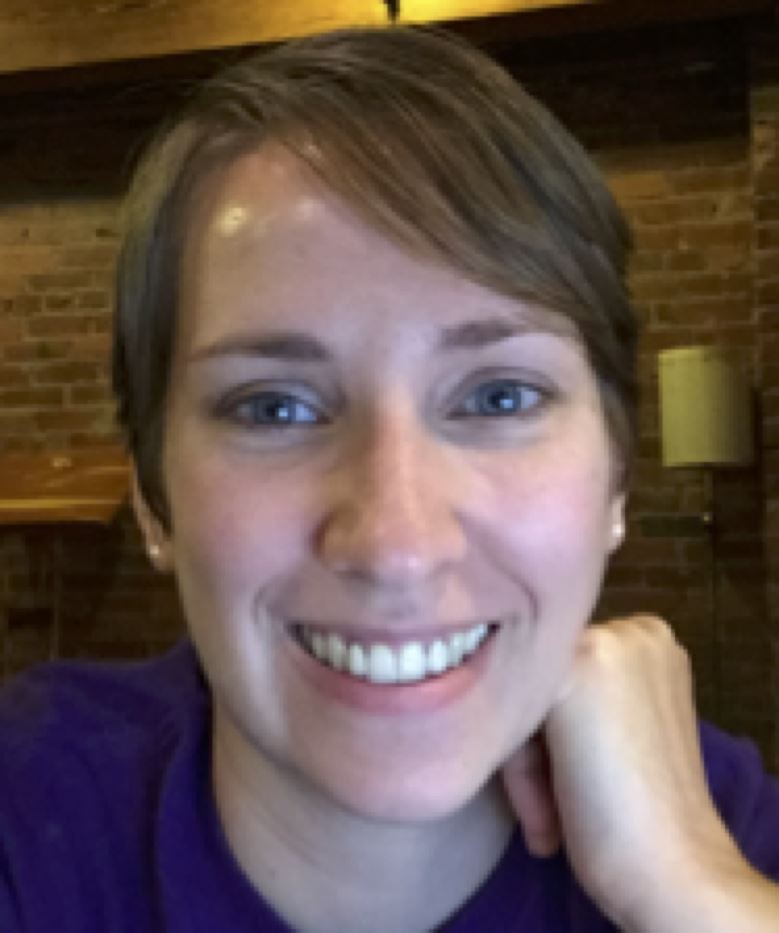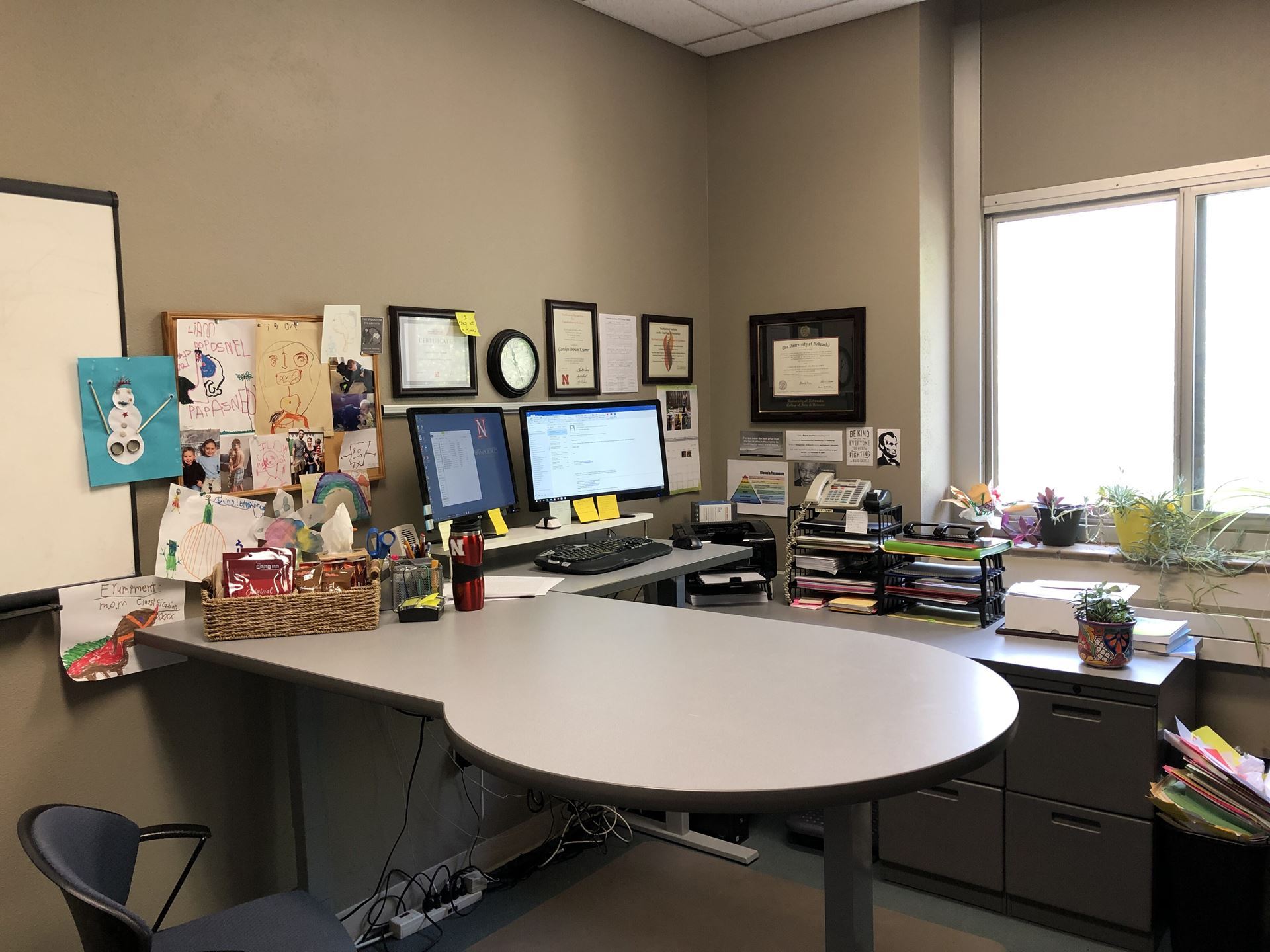 School name: University of Nebraska-Lincoln
School name: University of Nebraska-Lincoln
Type of school: Public R1 university
School locale: Small city (Lincoln, Nebraska)
Classes you teach: Introductory psychology, honors introductory psychology, social psychology, advanced social psychology, motivation and emotion, and career planning for psychology majors (co-taught with advising staff). Most are undergraduate classes, but advanced social psychology and motivation and emotion are cross-listed for both undergrads and graduate students.
Average class size: As large as 440 for introductory psychology, to about 40 students for senior-level classes, to about 15 for honors and learning community classes.
What’s the best advice about teaching you’ve ever received?
Do less. I have a bad habit of getting overwhelmed and burned out because I tackle too much at a time—major structural changes to several classes at once, changing the textbook and the assignments and the structure of a class simultaneously, or saying yes to too many service activities on top of a full teaching load. I try to fight day-by-day burnout by adopting the 1-3-30 rule suggested by a colleague when revising slides: write 1 note for next time, revise no more than 3 slides, and spend no more than 30 minutes revising. Beyond that, I’m mostly just nitpicking. And I try to fight long-term burnout by giving myself permission to make just one mid-sized change to each course each semester.
What book or article has shaped your work as a psychology teacher?
The very first teaching book I was introduced to, during my first semester of graduate school, was McKeachie’s Teaching Tips. I still come back to it for succinct recommendations backed up with evidence. More recently, I enjoyed Small Teaching by James Lang, which is a great reminder that small changes in my teaching practices can have a big impact on my students.
Briefly tell us about your favorite lecture topic or course to teach.
My favorite course is Advanced Social Psychology. It’s comprised mainly of junior and senior psychology majors, with a few sophomores and first-year graduate students thrown in. The course is structured around a series of yes/no controversial questions such as, “Is there a replicability crisis in social psychology?” I begin each unit with an interactive lecture to provide students with a refresher of the basic content from social psychology and some relevant extensions and updates from recent research. Then students get into discussion groups of about 12 and spend 50-60 minutes in peer-led discussion, delving deeply into the empirical research on both sides of the question and real-world implications of either possible answer. Although students get panicky at the beginning of the semester when they hear they will be responsible for leading an hour-long discussion, I give them plenty of support, encouragement, and feedback along the way—and the peers they initially feared in their discussion group often become close friends. Their term paper involves an in-depth analysis of empirical work on a yes/no question of their choice, and with the weekly practice they get building their critical thinking and analysis skills in response papers and discussion, students produce some very impressive final papers. At the end of the semester, students look back with pride at having accomplished tasks that felt overwhelming just a few months earlier.
Briefly describe a favorite assignment or in-class activity.
For the past several years, I’ve presented Stephen Chew’s depth-of-processing demonstration in my introductory psychology class. The class is split into quadrants, which are asked to process a word list shallowly or deeply, and with or without being forewarned of a quiz. They score their recall on the word list, then I have the whole class stand up. I ask them to sit down when I call out the number of words they got correct. It becomes apparent very quickly that those who processed shallowly performed worse than those who processed deeply, regardless of whether they knew they would be quizzed. I finish up with a brief presentation on evidence-based learning strategies, including how they can use deep processing while reading, in class, and while studying. The demo works every time, and is a great way to introduce aspects of research methodology and memory, or just to improve study habits.
What teaching and learning techniques work best for you?
My techniques vary widely from class to class. My 440-student Introductory Psychology class meets in a performing arts center without aisles, fold-out desks, or movable seating, so I generally use interactive lecturing (Bernstein, 2018) with clicker questions, think-pair-shares, small group work, videos, etc. In my smaller senior-level classes, I love using student-led discussions and small homework groups. In these classes, I assign groups carefully based on self-report surveys and observations in the first week of the semester, then keep the groups consistent throughout the semester so they really get to know each other. It’s so rewarding for students and for me to see how the groups negotiate differences, incorporate diverse peers, and accomplish things together that they couldn’t do alone.
 What’s your workspace like?
What’s your workspace like?
It starts organized and gradually descends into organized chaos, with piles growing in number and volume throughout the semester, until that glorious post-semester purge.
Three words that best describe your teaching style. Supportive, evidence-based, challenging
What is your teaching philosophy in 8 words or fewer? Improve scientific reasoning and application through evidence-based practices.
Tell us about a teaching disaster (or embarrassment) you’ve had and how you dealt with the situation.
Midway through the semester in my 400+ student section of introductory psychology, I was having problems with students using their laptops inappropriately and excessively in class, to the extent that peers were complaining about the level of distraction. In response, I introduced students to empirical evidence on the harmful effects of multitasking and digital distraction, showed them why it’s better to take notes by hand than on a computer, and gave them strategies for managing and reducing distractions. I then required that students wanting to use a laptop in class had to be “pre-approved” by showing me they had been taking notes appropriately and by displaying a tag on the front of their laptop so I could tell who had been pre-approved. I thought it was a reasonable request, but a small (and vocal) group of students did not. They deeply resented the new restriction on their freedoms, and complained both in class and online. The frustration (both mine and students’) spiraled, and after three weeks of increasing tension, poor participation, and distraction from students holding frequent side conversations, I gave up and just let them be the victims of their own distraction. (I also encouraged others to switch seats if they were being distracted.) I wish I had a fairytale ending to this story, but nope—I just had to tough it out to the end of the semester. This is my own hard-learned example of how it’s better to start with restrictions and then loosen them, than to start lenient and try to introduce restrictions.
What is something your students would be surprised to learn about you?
I have been in zero gravity. (Protip: It’s not for people with a weak stomach.)
What are you currently reading for pleasure?
The best book I’ve read in the last year is The Humans by Matt Haig, which tells the story of an alien who comes to Earth to kill a mathematics professor who is about to solve a major mathematical proof that will give humans the ability to travel through interstellar space, but while carrying out his mission, the alien begins to fall in love with humanity. It’s like a mash-up of The Hitchhiker’s Guide to the Galaxy and The Notebook. Hard to explain, but amazing.
What tech tool could you not live without?
I have two nominees: (1) youcanbook.me to let students arrange their own appointments during my office hours, and (2) Canvas to make an entirely paperless class with easy-to-use rubrics, student-friendly gradebook, and easy tracking of student group work.
What is your hallway chatter like? What do you talk to colleagues about most (whether or not it is related to teaching/school)?
Teaching ideas, campus news, and what we’re currently reading/watching. I’m particularly passionate about non-tenure-track faculty rights and academic freedom, and as a member of my institution’s faculty senate I try to keep my colleagues updated about relevant happenings.
